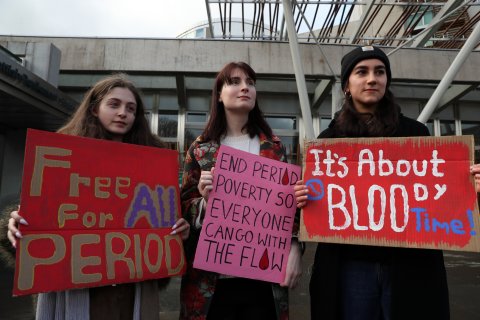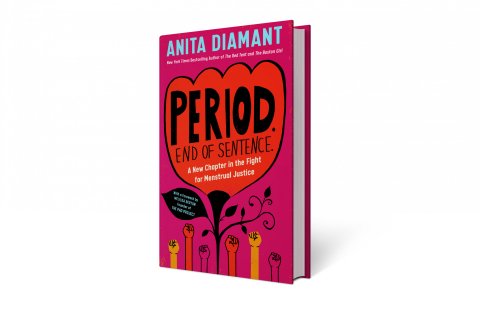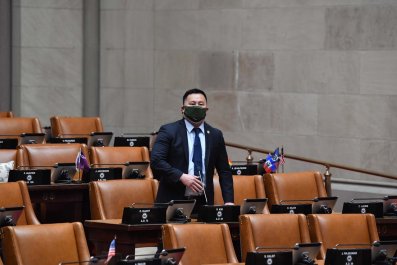Bestselling writer Anita Diamant tackles often-taboo subjects like menstrual justice, period poverty and the tampon tax in her new book, Period. End of Sentence. (Scribner, May), along with founder of The Pad Project, and Academy-Award winning documentary film producer Melissa Berton. In this Q&A, she discusses what misogyny has to do with it, what countries are at the forefront of the movement, how David Rose in Schitt's Creek was a surprising role model and how all-gender education is essential to eradicating shame surrounding what is simply the "healthy function of human anatomy."

How'd you get interested in this topic?
I've written a lot about women's health issues. I had recently published some essays about women who died in menstrual tents in rural Nepal, and the need for menstrual justice worldwide when Melissa Berton asked if I would be interested in writing this book. Perfect timing.
What is most important for everyone to understand about the danger in stigmatizing periods?
When menstruation is stigmatized, women become second-class citizens, and their self-esteem suffers. (The same holds true for non-female-identified menstruators.) The curse is one of the oldest and most common euphemisms for menstruation, which makes a healthy function of human anatomy into something shameful, polluting and even dangerous (to others). Menstruation isn't a curse, but stigma is.

In your bestselling novel, The Red Tent, women from Biblical times find community in a female-only dwelling while menstruating. In this new book, you advocate bringing the subject into the public sphere. How is publicizing the subject good for women?
Lifting the cone of silence around menstruation is how we erase the shame and fear associated with periods. The more we hear about menstruation—in classrooms, in conversation, on TV—the faster we de-fang the myth of "the curse" which makes women feel generically unclean, self-conscious and in mortal fear of leaking.
It also helps to have examples of how men can and should respond to menstruation, like the episode on the TV series Schitt's Creek, where David Rose (of all people) reacts to a girl's first period—and accident—calmly, with kindness and tact.
Which countries lead the fight against menstrual injustice?
Scotland, Wales, England and New Zealand are among the countries out in front, mandating period products in all schools, colleges and universities and providing funds to make it so. Recently, Scotland went a step further, and instructed local municipalities to come up with plans to ensure anyone in need will have access to free menstrual supplies.
Progress like this is virtually always the result of grassroots efforts, which often start with one person. Toronto special education teacher Jana Gudauskas' encounter with a homeless woman prompted her to start carrying a purse filled with period products and other necessities to give the next time she met a person in need. It wasn't long before she founded "The Period Purse," a nonprofit organization that collects and donates products, and successfully lobbied the city to put period products in homeless shelters, drop-in centers and all of its middle and high schools.
Toronto's example has inspired teachers unions and teen advocates to petition the province of Ontario to mandate free period products in all 72 school districts. And so it grows.
What will hasten progress in achieving menstrual justice?
We need comprehensive health education for children—taught in all-gender classes—that includes clear explanations of menstruation. According to experienced teachers, it's best to introduce the topic to kids before it's part of their lives, which makes it easier to revisit later, when it does get personal. Also, medical professionals need to be trained to ask about menstrual health when taking a patient's medical history—to see it as a vital sign, like blood pressure.
What is the root cause of menstrual injustice?
The root cause is misogyny—the prejudice against, distrust and dislike of women. Misogyny is a feature of patriarchal cultures, where men primarily hold power and believe in male supremacy. This doesn't mean that every man is a misogynist, but facts are facts, and one of every six American women has been the victim of rape or attempted rape.
Any favorite podcasts?
The Memory Palace: Creator and producer Nate DiMeo tells stories about little- known historical events and forgotten celebrities, recounts family anecdotes (his own and others) and finds wonder and surprise wherever he turns his attention.
Inner French: Hugo Cotton teaches the best intermediate-level French imaginable simply by talking about interesting subjects; from asking whether French cuisine is passé to an overview of France's history in Haiti. He does not translate anything into English, and best of all, no grammar lessons. J'adore.
The Allusionist: Helen Zaltzman's dry and witty exploration of linguistics: history, slang, neologisms and sometimes, puns.

What are you most looking forward to post-pandemic?
Having friends over for dinner, sitting in a coffee shop and watching the world go by—with a friend—and going to the theater to see a play.
What's next on the horizon for you?
I don't really decide on new projects so much as discover them; I am on the lookout.














